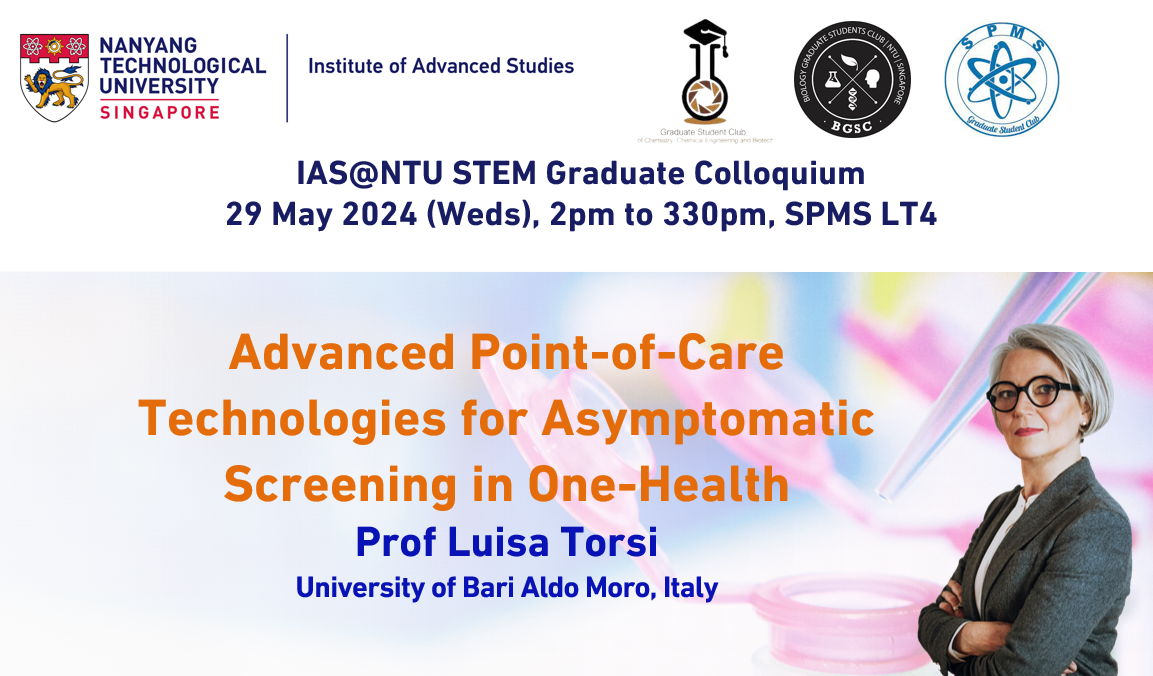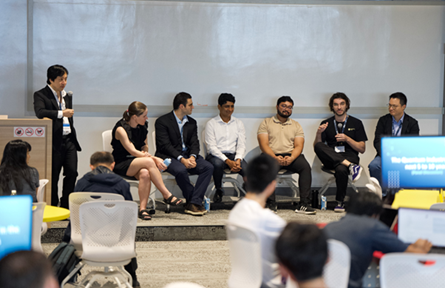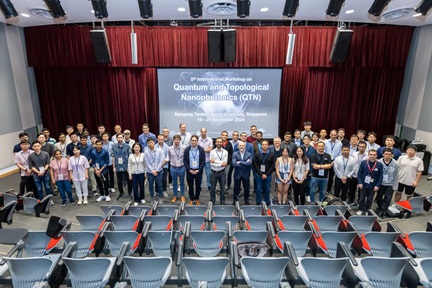Advanced Point-of-Care Technologies for Asymptomatic Screening in One-Health by Prof Luisa Torsi
IAS STEM Graduate Colloquium Jointly Organised with the Graduate Students’ Clubs
On 29 May 2024, the IAS and Graduate Students’ Club of CCEB, SBS and SPMS jointly organised the STEM Graduate Colloquium titled Advanced Point-of-Care Technologies for Asymptomatic Screening in One-Health by Prof Luisa Torsi.
Professor Luisa Torsi is a Professor at the University of Bari Aldo Moro, Italy. Her research is at the intersection of organic chemistry, material science and biotechnology specifically on single molecule electronic sensors for detection
of biomolecules. She has published more than 400 papers in top journals like Science, Nature Materials and Nature Communications. She is also the co-inventor of several patents and is the recipient of several awards and honours including the IUPAC
2019 Distinguished Women in Chemistry or Chemical Engineering award.
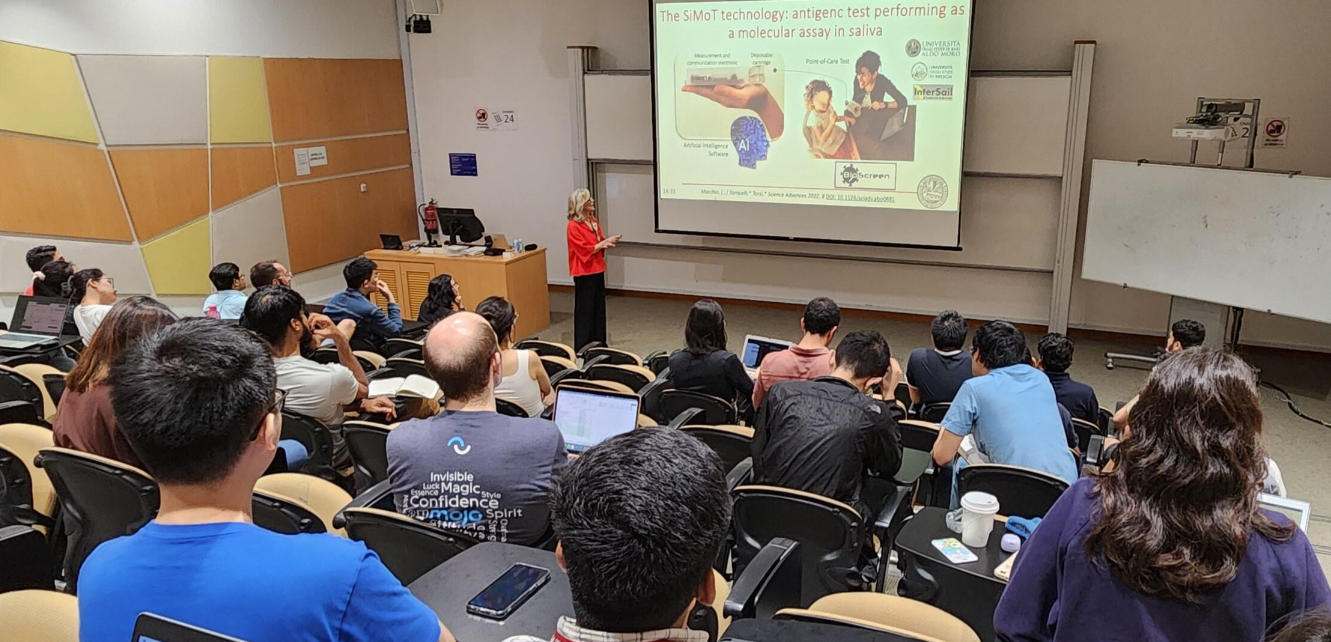
Prof Luisa Torsi presenting her research to a captivated audience.
Prof Torsi began her presentation with the development and use of bioassays, emphasising the importance of assays like ELISA (Enzyme-Linked Immunosorbent Assay), qPCR (quantitative Polymerase Chain Reaction), NGS (next generation sequencing) and SiMoA (Single Molecule Array). She highlighted the significant milestones these technologies achieved in diagnostics and their limitations, particularly in terms of sensitivity, speed, and size.
In addition, Prof Torsi shared her groundbreaking work on developing single-molecule detection techniques using organic field-effect transistors (OFETs). She detailed the development of the SiMoT (Single Molecule Detection with Large Transistors) platform; a bioelectronic system capable of detecting single molecules of proteins or genes in bodily fluids, which essentially consists of a handheld device having antibodies or probes connected to a bio-electronic sensor. On top of having high sensitivity, this device is fast, cost-effective, can be adapted to different diagnoses by changing the antibodies attached to the sensor. She highlighted that this is also capable of multiplexing – the ability to detect multiple disease markers at the same time; and is the only system capable of detecting both proteins and nucleic acids.
She emphasised that the SiMoT platform can be used for early detection of various diseases, including cancers, and infectious diseases. This is currently in clinical trials, with the aim of making a point-of-care device which is easy to use and with the sensitivity of a bench-top device.
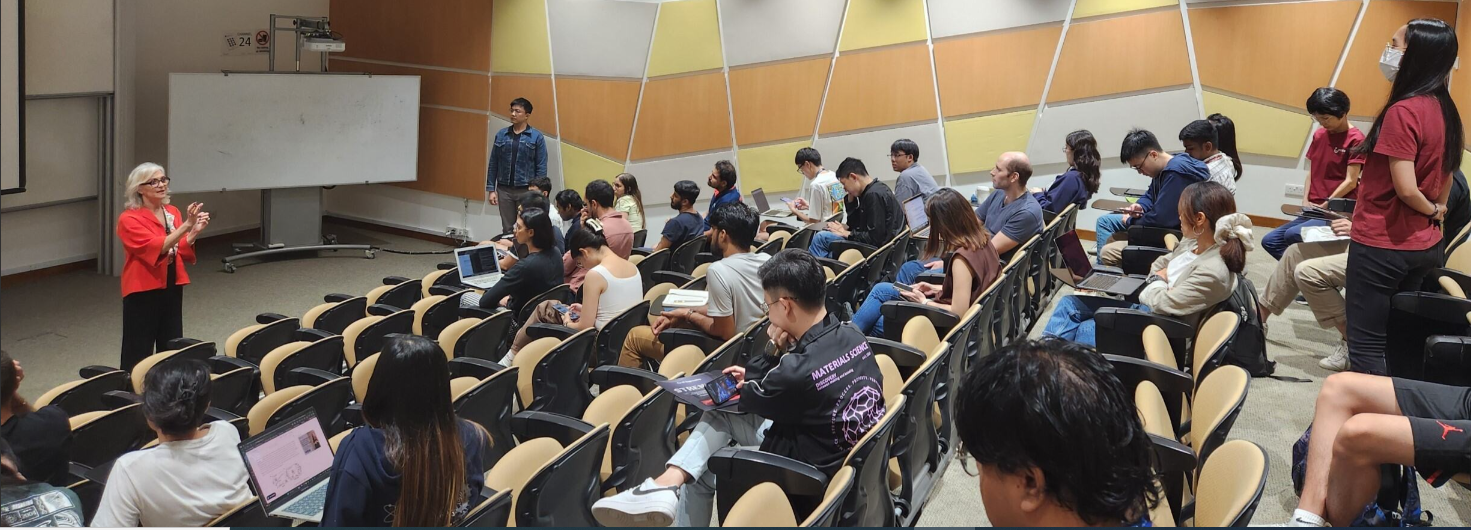 Prof Torsi addressing questions from the audience during the Q&A session, providing deeper insights into the technical aspects of her work and its practical applications.
Prof Torsi addressing questions from the audience during the Q&A session, providing deeper insights into the technical aspects of her work and its practical applications.
The colloquium underscored the transformative potential of Prof Torsi’s pioneering research in healthcare diagnostics, showcasing an inspiring and compelling presentation of cutting-edge advancements in single-molecule bioassays. Her innovative
work promises to revolutionise point-of-care diagnostics, providing healthcare providers with the tools necessary to deliver timely and accurate diagnoses, ultimately improving patient outcomes. The insights shared during the colloquium not only highlighted
the scientific brilliance and practical applications of her research but also sparked engaging discussions and collaborative ideas among attendees, Prof Torsi's contributions present a potential leap forward in our ability to timely detect and diagnose
diseases at their earliest stages, paving the way for a healthier future.

Written by: Parth Patankar | NTU School of Chemistry, Chemical Engineering and Biotechnology Graduate Students' Club
“I enjoyed the talk and learnt how semiconductors play a role in healthcare.” - Kumar Rajesh (PhD Student, IGP-ERIAN)
“The topic was useful and I learned a lot about how medical testing works.” - Yuhas Michael John (PhD Student, IGP)
Watch the video recording














/enri-thumbnails/careeropportunities1f0caf1c-a12d-479c-be7c-3c04e085c617.tmb-mega-menu.jpg?Culture=en&sfvrsn=d7261e3b_1)

/cradle-thumbnails/research-capabilities1516d0ba63aa44f0b4ee77a8c05263b2.tmb-mega-menu.jpg?Culture=en&sfvrsn=1bc94f8_1)

